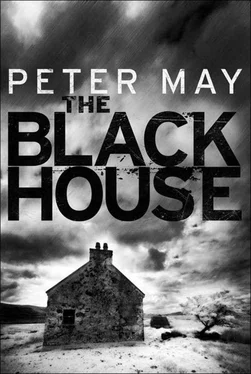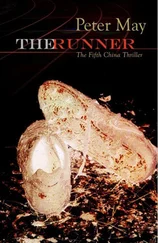Peter May - The Blackhouse
Здесь есть возможность читать онлайн «Peter May - The Blackhouse» весь текст электронной книги совершенно бесплатно (целиком полную версию без сокращений). В некоторых случаях можно слушать аудио, скачать через торрент в формате fb2 и присутствует краткое содержание. Жанр: Триллер, на английском языке. Описание произведения, (предисловие) а так же отзывы посетителей доступны на портале библиотеки ЛибКат.
- Название:The Blackhouse
- Автор:
- Жанр:
- Год:неизвестен
- ISBN:нет данных
- Рейтинг книги:5 / 5. Голосов: 1
-
Избранное:Добавить в избранное
- Отзывы:
-
Ваша оценка:
- 100
- 1
- 2
- 3
- 4
- 5
The Blackhouse: краткое содержание, описание и аннотация
Предлагаем к чтению аннотацию, описание, краткое содержание или предисловие (зависит от того, что написал сам автор книги «The Blackhouse»). Если вы не нашли необходимую информацию о книге — напишите в комментариях, мы постараемся отыскать её.
The Blackhouse — читать онлайн бесплатно полную книгу (весь текст) целиком
Ниже представлен текст книги, разбитый по страницам. Система сохранения места последней прочитанной страницы, позволяет с удобством читать онлайн бесплатно книгу «The Blackhouse», без необходимости каждый раз заново искать на чём Вы остановились. Поставьте закладку, и сможете в любой момент перейти на страницу, на которой закончили чтение.
Интервал:
Закладка:
Fin and Gunn drove in silence, thoughts filled by the images of clinical post-mortem carnage they had witnessed at the mortuary. There was no greater reminder of your own mortality than to witness another human being laid bare on a cold mortuary table.
At just about the halfway point, the road took a dip before rising again to a peak from which the Atlantic was distantly visible, venting its relentless anger on a crumbling coastline. In the hollow of the dip, about a hundred yards from the north side of the road, stood a small stone house with a brightly painted green tin roof. A shieling, once used by coastal crofters as a home during the summer, when they would move their beasts inland for better grazing. They were everywhere on the island. Most of them, like this one, had long since fallen into desuetude. Fin had seen the green-roofed shieling on the Barvas moor every Monday on his way to the school hostel in Stornoway. And again on the way back on the Friday. He had seen it in all weathers. And he had seen it often, as it was today, lit by the sun from the south, standing in vivid outline against the blackest of skies in the north. It was a landmark that almost every man, woman and child on the island would recognize. For Fin, however, it had a special significance, and the sight of it now filled him with a pain he had long since forgotten, or at least buried in a dark place he had no wish to revisit. But for as long as he was on the island, he knew that there were memories from his past he could not avoid. Memories which, like childish things, he had put away when he became a man nearly twenty years before.
The drive up the west coast was a trip that took him deeper into that past, and Fin sat silently in the passenger seat while Gunn drove. Long stretches of empty road linked bleak and exposed settlements huddled around churches of various denominations. The Church of Scotland. The United Free Church of Scotland. The Free Church of Scotland. The Free Church of Scotland Continuing — the Wee Frees , as the free churches were universally known. Each one was a division of the one before. Each one a testimony to the inability of man to agree with man. Each one a rallying point for hatred and distrust of the other. He watched the villages drift by, like moving images in an old family album, every building, every fencepost and blade of glass picked out in painfully sharp relief by the sun behind them. There was not a soul to be seen anywhere. Just an occasional car on the road, or at the odd village store, or filling station. The tiny village primary schools, too, were empty, still shut for the summer holidays. Fin wondered where all the children were. To their right, the peatbog drifted into a hazy infinity, punctuated only by stoic sheep standing firm against the Atlantic gales. To their left, the ocean itself swept in timeless cycles on to beaches and into rocky inlets, creamy white foam crashing over darkly obdurate gneiss, the oldest rock on earth. The outline of a tanker, like a distant mirage, was just discernible on the horizon.
At Cross, Fin saw that the tree which had once grown tall in the shelter of the Cross Inn had been cut down. A landmark gone. The only tree on the west coast. The village seemed naked without it. The Cross Free Church still dominated the skyline, dark granite towering over the harled and double-glazed homes of stubborn islanders determined to see off the elements. And occasionally their prayers were answered. For sometimes, on days like today, the wind took pity and the sky let the sun through to soften its razor edge. Hard lives rewarded with fleeting moments of pleasure.
Not far beyond the church the road peaked, and they had a view down towards the northernmost tip of the island. The gable ends of white-painted cottages caught the sunlight all along the eastern horizon, in between the ruins of old black-houses, textured stone in random patterns pushing up out of the turf. And Fin saw the familiar curve of the land dipping away to the village of Crobost on the cliff road, and the distinctive silhouette of a church built to show the people of Cross that the people of Crobost were just as devout.
The road took them down through Swainbost and Lionel to the tiny village of Port of Ness, past the single-track roads that turned off towards Crobost and Mealanais. There the road ended, and the cliffs formed a natural harbour at the the north-west end of half a mile of empty golden beach. Man had enhanced nature by building a breakwater and harbour wall. At one time trawlers and fishing boats had plied their trade in and out of the harbour. But nature had struck back, smashing down the breakwater at one end, where great chunks of semi-submerged rock and concrete had fought and failed to stand firm against the irresistible assault of the sea. The harbour was all but deserted now, used as a haven only by small fishing boats, crabbers and dinghies.
Gunn parked outside Ocean Villa opposite the harbour road. A black and yellow crime-scene tape whipped and snapped in the wind, stretched across the road to prevent public access. A uniformed officer, leaning against the wall of the Harbour View Gallery, hastily ditched his cigarette as he recognized Gunn getting out of the driver’s side. Some comedian had obliterated the s from the To the Shore sign pointing towards the harbour. Fin wondered if it was a comment on the succession of teenage girls who had lost their virginity over the years in the boatshed where, on Saturday, a fallen angel had died.
They stepped over the tape and followed the winding road down to the shelter of the quay. The tide was in, green water over yellow sand. A crabber and a group of dinghies were tied together at the inner wall, creels piled on the quay above them beside a tangle of green netting, and pink and yellow marker buoys. A larger boat, dragged up out of the water, was tilting at a dangerous angle in the sand.
The boatshed was much as Fin remembered it. Green corrugated-iron roof, white-painted walls. The right-hand side of it was open and exposed to the elements. Two window slits in the back wall opening out to the beach beyond. There were two large wooden doors on the left-hand side. One was shut, the other half-open, revealing a boat on a trailer inside. There was more crime-scene tape here. They stepped into the semi-dark of the closed-off half of the building. Angel’s blood still stained the floor, and the smell of death lingered with the diesel fumes and the salt water. The wooden cross-beam overhead revealed a deep groove cut by the rope where Angel’s murderer had hauled him up to hang there. The sounds of the sea and the wind were muted in here, but still a presence. Through the narrow window openings, Fin could see that the tide was just turning, seawater starting to recede over smooth wet sand.
Apart from the staining, the concrete floor was unnaturally clean, every scrap of debris carefully collected by men in Tyvek suits for scrupulous forensic examination. The walls were scarred with the graffiti of a generation. Murdo’s a poof; Annaloves Donald; and that old classic, Fuck the Pope . Fin found it almost unbearably depressing. He stepped outside and into the open half of the shed and took a deep breath. A crudely fashioned swing hung from the rafters, two strips of wood bound together with plastic orange rope to create the seat. The same orange rope which had been used to suspend Angel from the rafters next door. Fin became aware of Gunn at his shoulder. He said, without turning, ‘So have we any idea why someone might have wanted to kill him?’
‘He wasn’t short of enemies, Mr Macleod. You should know that. There’s a whole generation of men from Crobost who suffered at one time or another at the hands of Angel Macritchie or his brother.’
‘Oh, yes.’ Fin spat on the floor as if the memory brought a bitter taste to his mouth. ‘I was one of them.’ He turned and smiled. ‘Maybe you should be asking me where I was on Saturday night.’
Читать дальшеИнтервал:
Закладка:
Похожие книги на «The Blackhouse»
Представляем Вашему вниманию похожие книги на «The Blackhouse» списком для выбора. Мы отобрали схожую по названию и смыслу литературу в надежде предоставить читателям больше вариантов отыскать новые, интересные, ещё непрочитанные произведения.
Обсуждение, отзывы о книге «The Blackhouse» и просто собственные мнения читателей. Оставьте ваши комментарии, напишите, что Вы думаете о произведении, его смысле или главных героях. Укажите что конкретно понравилось, а что нет, и почему Вы так считаете.












